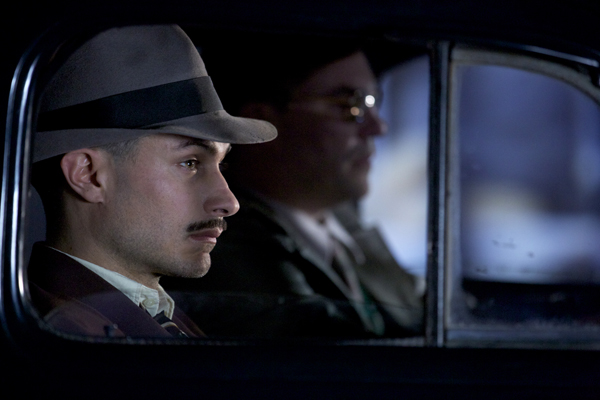Chilean director Pablo Larraín (The Club) turns a standard biopic inside out in this stylish thriller with a literary bent. The film premiered to critical acclaim at the Directors’ Fortnight section of the 2016 Cannes Film Festival and makes its American premiere at this year’s New York Film Festival.
The year is 1948, and beloved national poet and Communist Party member Pablo Neruda (Luis Gnecco) is in political exile and on the run. On his heels is police officer Oscar Peluchonneau (Gael García Bernal), who engages Neruda in a cat-and-mouse chase that is as much metaphysical as it is in the flesh. Providing the trenchant voice-over narration, the fictional Peluchonneau ponders the relationship between himself and the fugitive in regard to ideas of manhood and heroism. Neruda stays one step ahead, on the trail and in the battle of the wills.
Set three years after World War II ended, the Cold War is manifest in Chile, and as such President Gabriel González Videla (Alfredo Castro) outlaws communism, forcing Neruda into hiding along with his aristocratic artist wife, Delia del Carril (Mercedes Morán), 20 years his senior. Idealistic, but thoroughly bourgeois, the couple raises eyebrows in a complicated political landscape in which detractors say such things as “Communists hate to work. They’d rather burn churches. It makes them feel alive.”
Neruda shrugs this off. After all, he is a poet of the people, and the so-called “King of Love” has countless admirers. At a decadent costume party early on, he recites to a rapt audience his most famous work, “Tonight I Can Write the Saddest Lines,” from the volume that brought him wide acclaim at age 20, Twenty Love Poems and a Song of Despair (1924). It includes his most famous line, “Love is so short, forgetting is so long.”
Through the goodwill of friends and supporters, Neruda is smuggled from house to house and continues to write with the help of surreptitious messengers. On this road trip, he leaves behind signed books, which act as breadcrumbs to taunt his pursuers. Rather than dampening Neruda’s creativity, ostracism emboldens him. He completes Canto General, an epic collection of poems, while his wife continues to work on her haunting, expressionistic paintings. (They count Pablo Picasso among their high-profile supporters.) Fearlessly, Neruda goes out in public, sometimes for a night at a brothel, where, like most women in his milieu, the prostitutes find him enchanting.
The heady mix of politics, art, sex, defiance, and spectacular cinematography by Sergio Armstrong create a bubbling cauldron in which to stage the story. The ingenious script by Guillermo Calderon (The Club) depicts Neruda as a symbol of unbridled ego—cocksure and bulletproof. He uses the pattern of the poet’s verse to inform the dialogue, especially Peluchonneau’s voice-over.
Peluchonneau asks himself if Neruda is real at all, and alternately conflates his own identity with the poet’s, as well as with a legendary chief officer. According to Neruda’s wife, Peluchonneau is just a supporting character in her husband’s life or perhaps even a figment of his active imagination. Sounding just like the poet himself, Peluchonneau may have been conjured by Neruda to pave the way for a heroic ending.
Michael Radford’s 1994 Italian romance, Il Postino, portrays the next stage in Neruda’s exodus, and a generation of cineastes discovered Neruda’s work through that film, which follows a local postman on a secluded island who hand-delivers Neurda’s mail and becomes inspired by his poetry.
A must-see for both its sly, intelligent filmmaking and its seductive portrait of an artist-cum-political fugitive, Neruda deserves multiple viewings. It is also Chile’s Oscar submission for best foreign language film.







Leave A Comment